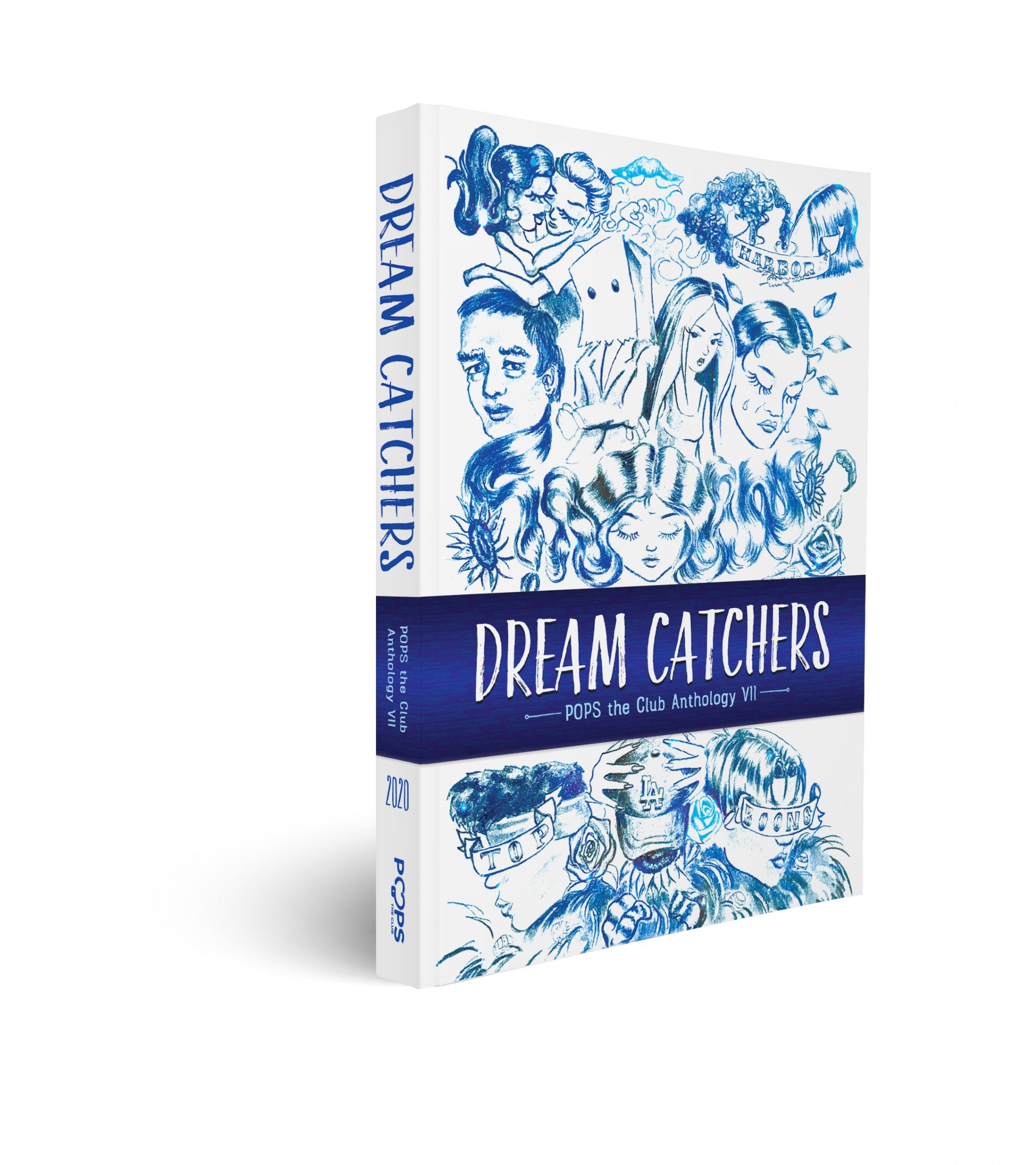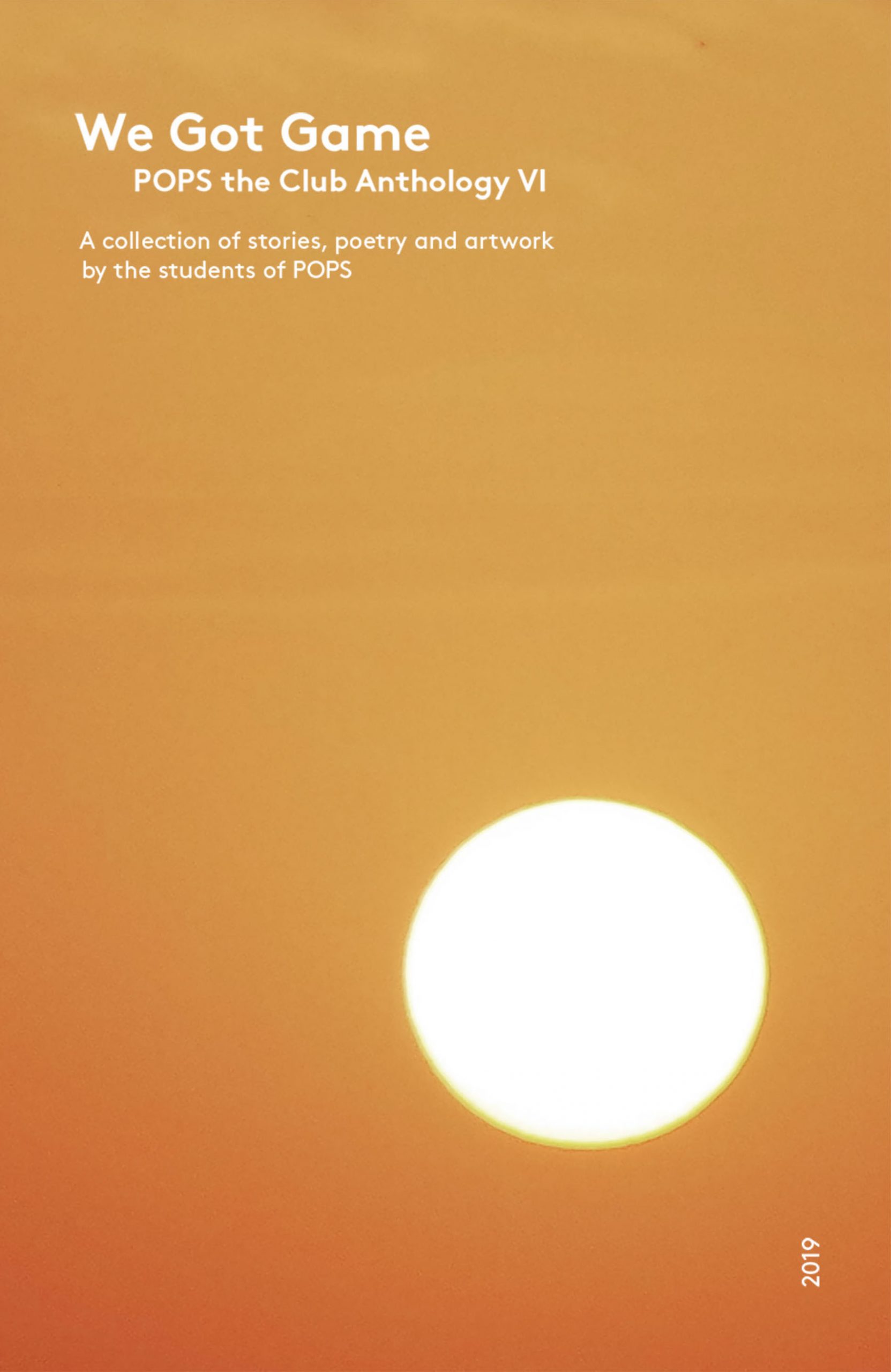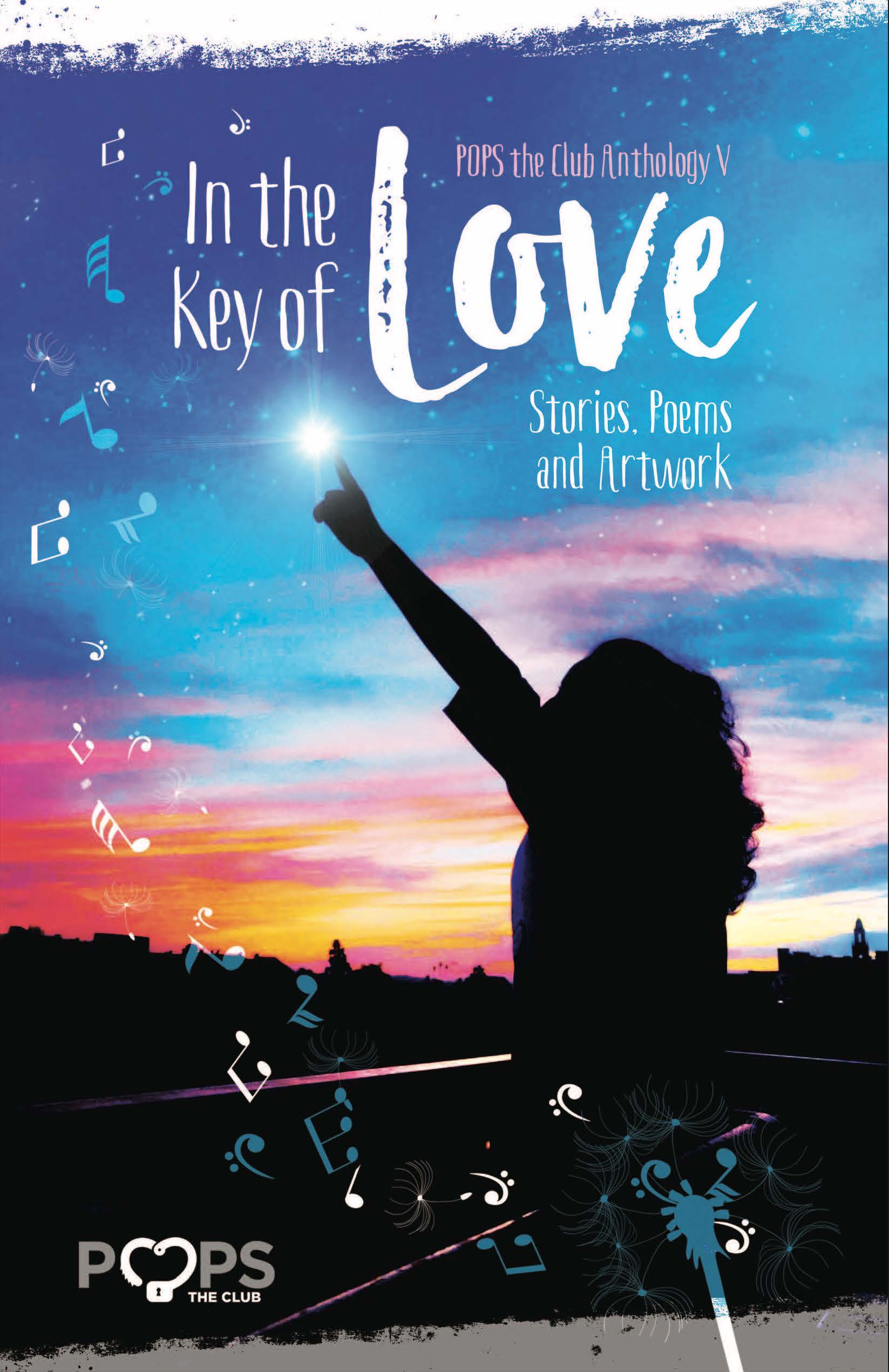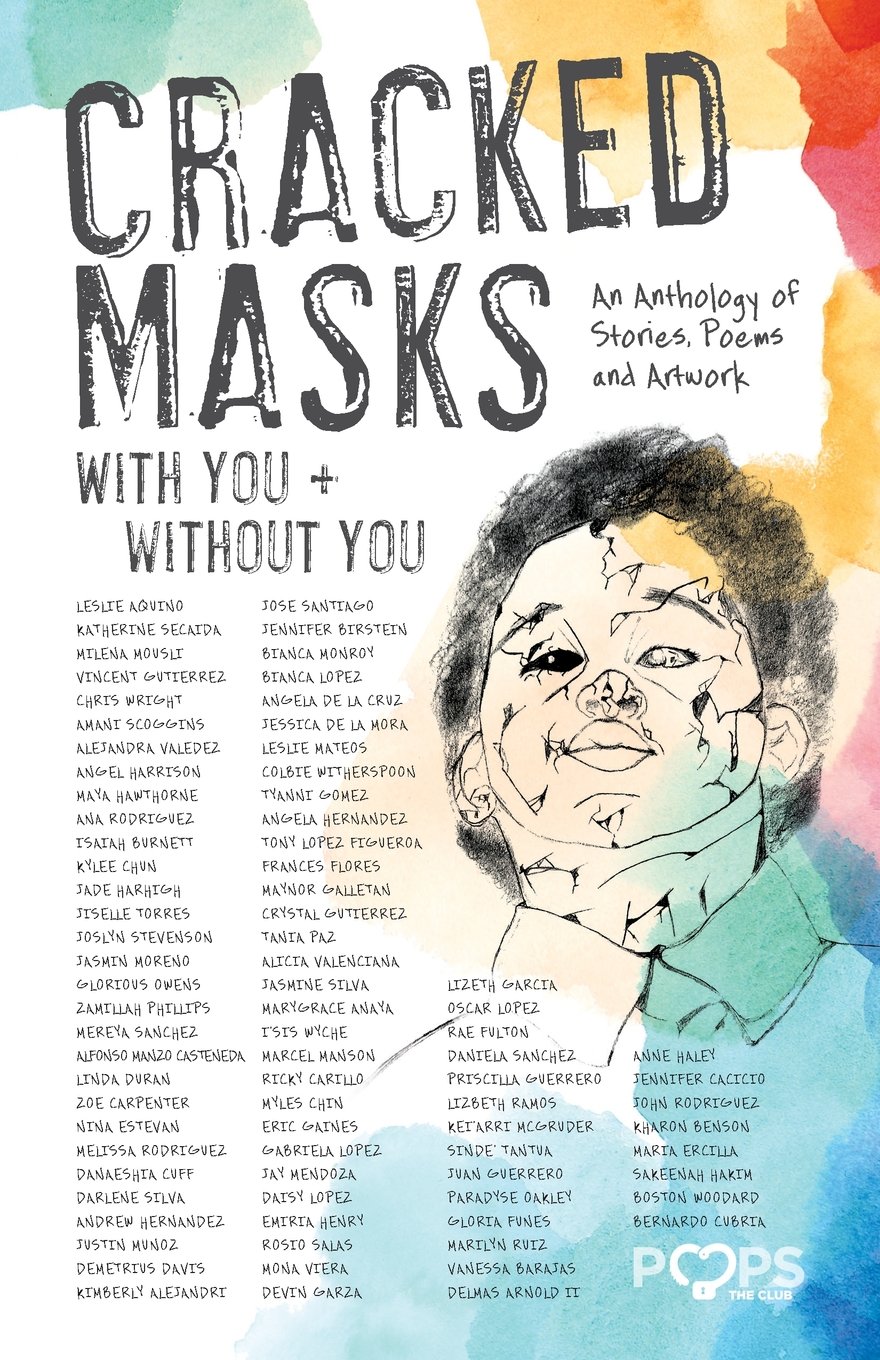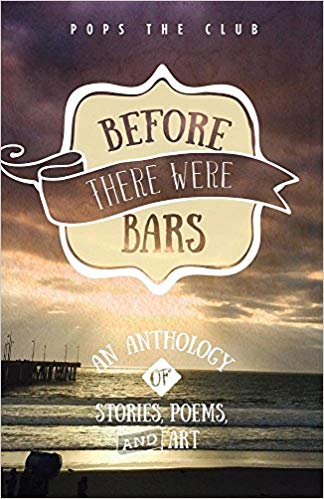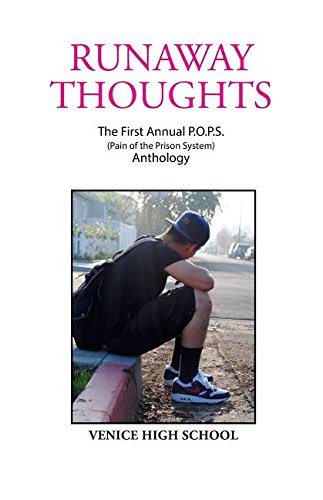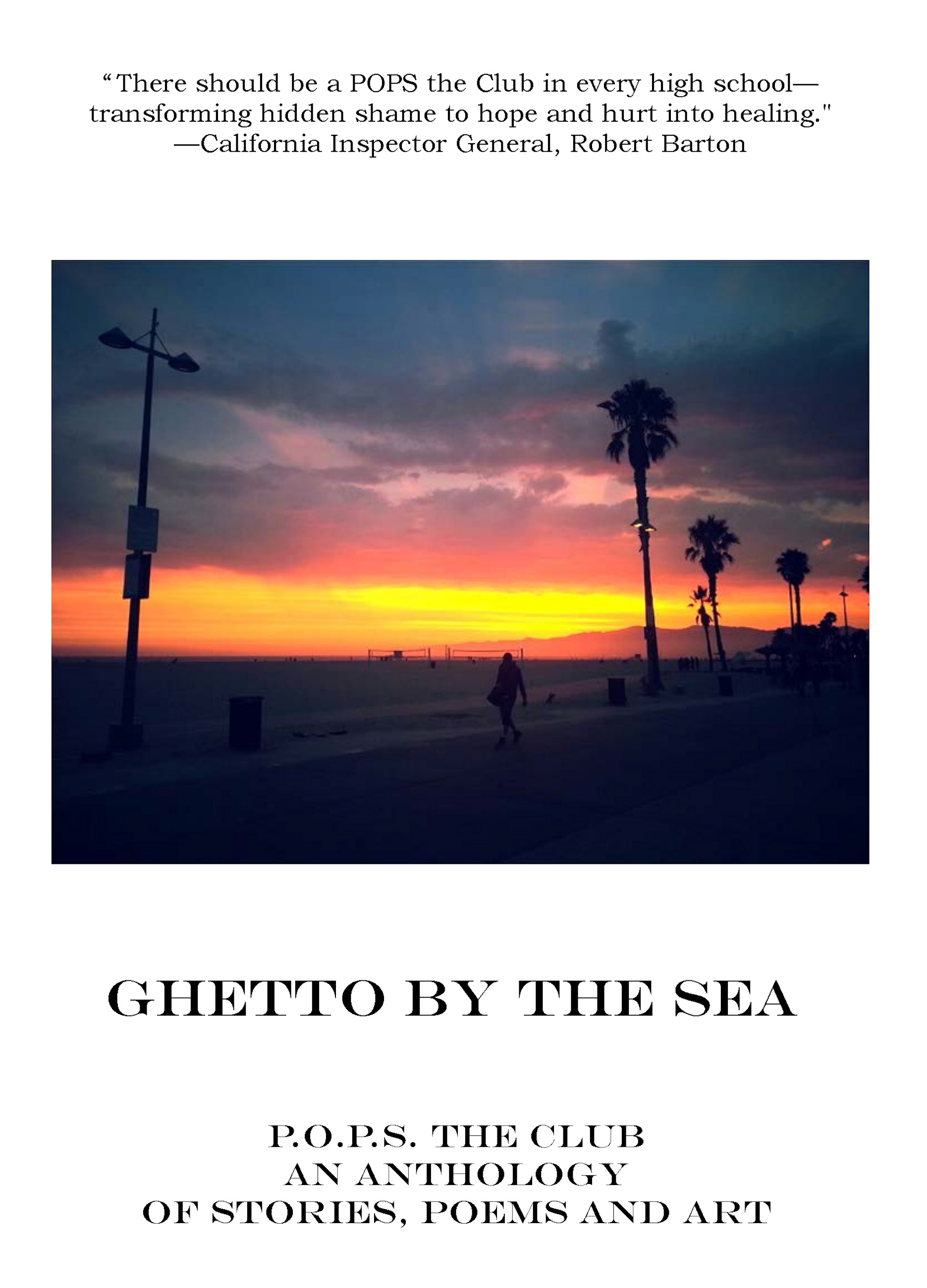From its founding, each year POPS the Club has published a collection of the poetry, stories, essays and artwork that were created by members of POPS clubs and its graduates and community partners. These books are healing for families, relished by students from elementary school through college, used in prisons and detention centers as inspiration, and praised by librarians, educators and literary journals. In 2020 we launched Out of the Woods Press to expand the reach and range for these critical voices and visions.
AVAILABLE FOR PURCHASE
ADVICE TO 9th GRADERS
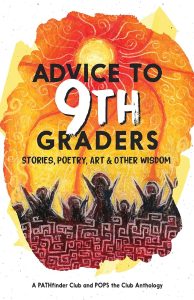
Early in this volume of poetry, essays, stories, and wisdom created by the youth of The PATHfinder Club and POPS the Club and edited by Amy Friedman, Tamira Shany advises readers that we have just two options: “Take pride and fail or endure and succeed.” As you dive into Advice for 9th Graders (designed to guide 9th graders as they navigate high school but equally inspiring for the rest of us), we begin to understand that these young people are steering us toward endurance. As Rachael Galper’s photograph, Biased Comparisons, so beautifully illustrates, the best course is to find a way to express yourself without fear of judgment.
These young people, whose lives have been impacted by incarceration and other systems, have found a sense of comfort, or, as Jess Sandoval writes, “I made myself my home.” The anthology resounds with sage advice and poetry; with sometimes sad longings of youth; and with buoyant joy, sharp insights, and unstoppable energy.
DEAR FRIENDS
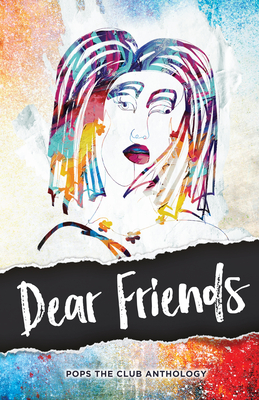
Kat Secaida, wearing white Converse sneakers, wanders through her hood, collecting the stories of the Culver City projects. Julian Izaguirre recalls the drama at school that starts when you don’t want it to.
The young artists and poets in Dear Friends, the eighth anthology from POPS the Club—a nonprofit serving youth impacted by the Pain of the Prison System—forged their work largely during the pandemic and in isolation. Though they were separated by screens from friends, teachers, counselors, and peers, their work still brims with hope and curiosity. It is searing, straightforward, sensitive, and sometimes startling in its wisdom and honesty. I’m not someone who’s always right, Mikey Estrada writes, but I always try to be. A kid who likes to read and learn . . . a kid who grew up in violence and in gangs . . . where others were waiting for me to fail. Instead, this volume speaks of their success and of all they have to teach us.
POPS the Club offers a sacred space where those with incarcerated loved ones can connect with each other, creating a supportive and open-hearted community. Students draw, paint, write, photograph, talk, listen, and share their stories, untangling the web of shame, stigma, and sorrow these young people too often face.
PRAISE FOR DEAR FRIENDS
“This collection reflects the deeply troubling times we live in, where we’ve so callously thrown away so many of our nation’s families. And it is an honest and careful and loving reflection, presenting the joys and pains and passions and losses and hopes and dashed dreams this era represents. This is a deeply human work. In a word, it is a gift.”
“I am left nearly speechless—just in total awe—by the wisdom and pathos that leap off of every page of this moving collection. An extraordinary window into a world of pain, hope, and, yes, wonder.”
“Dear Friends’ youth contributors understand the impact of mass incarceration and its collateral consequences on a cellular level. Their artwork, poetry, and stories offer a unique and relevant lens into a world that more of society must begin to care about if justice and equity are ideals we genuinely aspire to.”
“The personal stories of kids who’ve committed no crimes but have to face the punishment—fear, loss, loneliness, powerlessness, and rejection—have their experience amplified, and beyond that, their talent shines. The writer’s narrative, once silenced by shame and isolation, becomes urgent, surprising, and powerful on these pages. Dear Friends is a unique journey into understanding the compassion, the empathy, and the will we’ll need to rebuild both our youth and our prison system. I know I am forever changed by their stories.”
“Dear Friends shakes my soul with the achingly lucid soul expressions of young people. With windows in their eyes and hearts, wide open (sometimes painfully), my, how they teach us. This book reminds me that nothing—certainly not the ills of society—is lost on the young, as we’d so desperately like to believe. But also in reading, I remember the power of a creative community as a safe haven and launch pad. This book reminds me to pay closer attention to wisdom across generations. Thank you for this and so much more, writers and artists of POPS the Club.”
“POPS the Club creates a space that allows students to explore their trauma, their pain, and their resiliency through art. This organization does so much to destigmatize the shame of the carceral system and turn it into hope. I will forever consider myself a POPS club member, and I hope you will consider volunteering and donating after reading their eighth anthology, Dear Friends, a beautiful book.”
“We are the stories we tell about ourselves. The courage of the young artists of POPS the Club is on full display in this latest anthology of their work. I am overwhelmed by their honesty, hope, and humor. They have discovered their greatest power can be realized by standing vulnerably in the center of their own narratives and inspiring all of us to do the same.”
“I’m always amazed by the exceptional writing that emerges from POPS clubs, and Dear Friends is no exception. This anthology is doing important work, giving voice to the lived experiences of those most directly impacted by the broken criminal justice system. But it’s also full of funny, fresh, and vibrant writing. The writing is both essential to read and fun to read.”
“Dear Friends continues the tradition of intense, honest, and thoughtful stories and artwork that make me pause, question my own thinking, and wonder how I can do more. More importantly, this book gives me reason to celebrate and appreciate the authors and artists. Dear Friends is a compelling and insightful resource for youth and their families who are dealing with incarceration and its impacts and for those who are supporting them.”
“The poems, stories, art, and photographs in this heartbreaking, insightful, and often humorous anthology are required reading for anyone looking to understand the personal impact of the prison system. The bravery, honesty, and wisdom of these young voices give me hope for our future.”
“The writing in this anthology has so much power, it is as though the students are breathing it onto the page. POPS the Club is a gift to them, and they are a gift to all of us. I have worked with teens for the last forty years, so I know that clearly POPS is connecting with students and helping them connect with themselves in a profound way.”
“The discovery of fire and hunger and resilience and courage where we might never have even thought to have looked—that’s what you’ll find in the pages of Dear Friends. And so much more.”
“Dear Friends is a luminous collection of writing and a window into the very human experience of the teen members of POPS the Club. The pages are filled with vivid snapshots describing their reality and their complex inner lives. The writing is simultaneously exciting, wildly imaginative, moving, hopeful, innocent, blunt, and painful. These young people are an inspiration, and this anthology amplifies their voices—hopefully, the reach will be wide so that another teen who is experiencing the pain of the prison system can feel hope and less alone.”
“Creative expression is a gateway to empathy and community. POPS anthologies offer forums for our students to share their truths on their own terms through their art. The beauty, honesty, and raw sophistication of their poetry, prose, photography, and drawing/painting is a gift that can inspire societal change.”
“The wisdom of young people will amaze and inspire in POPS the Club’s latest anthology. Their work is a pointed reminder that every one of us deserves to stand boldly in our lived experiences. The young people of POPS the Club are more than an inspiration—they are incredible artists, thinkers, dreamers, and doers. Through community, POPS the Club combats shame, facilitates healing, and reduces the isolation that so many young people impacted by familial incarceration are forced to experience. As the work in the latest anthology shows, POPS is more than a club—it is a community committed to elevating and listening to the voices of young people who are far too often silenced.”
“I’m always left speechless and in total awe by the POPS anthologies, and Dear Friends is no exception. The students of POPS remind us of the limitless power of art to heal and transform any dire situation into a source of hope, strength, and perseverance. I’m constantly astonished by their candor and ability to share their deepest fears and vulnerabilities. In a society where we’re bombarded with news articles detailing statistics and generalities related to mass incarceration, the POPS anthologies illustrate the visceral toll the problem has taken on countless youth across the country.”
DREAMCATCHERS
Dreamcatchers, the seventh volume created by members of POPS the Club, is an enlightening and inspiring collection of art, prose, and poetry by high-school students with a unique perspective: they have encountered the pain of the prison system–most have incarcerated loved ones. By telling and sharing their stories, they not only start the process of healing but also illuminate a world many of us are unfamiliar with.
POPS the Club offers a sacred space where those with incarcerated loved ones can connect with each other, creating a supportive and open-hearted community. Students draw, paint, write, photograph, talk, listen, and share their stories, untangling the web of shame, stigma, and sorrow these young people too often face.
This collection represents the work of high school students from Los Angeles, Harrisburg, Atlanta, and New York City.
“The POPS the Club’s writers and artists… have much to teach anyone who is interested in social
justice. Their stories, poetry, and artwork overflow with the experiences, wisdom, and insights of
those whose lives have been touched by incarceration. They are not to be missed!”
“With these anthologies, POPS the Club has provided a critical space for young people affected
directly by mass incarceration to voice their hurts, their emptiness, their awareness, and their
poetic expressions. I’m awed by the unity of thought, feelings, and words that this writing forges
against the odds.”
“The POPS anthologies are a unique experience—a collection of poems, essays, and artwork that
intimately connect us to a population of teenagers who are navigating life in a very particular
way. These teens share their work with brave authenticity and a maturity well beyond their years.
The work is powerful, heartbreaking, inspiring, and sobering. A must-read for anyone who truly
cares to know the full impact of our prison system.”
“The POPS the Club anthologies are monumental works of vital, inspiring stories we all need to
read.”
“A must-read for directly impacted individuals and their allies, the POPS anthologies excel
where others have fallen short. By bringing the voices of the youth to the forefront, POPS the
Club gives readers unprecedented access to the experience of familial incarceration by the
experts themselves—directly impacted individuals.”
PRAISE FOR DREAMCATCHERS
“POPS the Club is a nonprofit organization designed to provide support to teens whose lives have been impacted by the pain of the prison system. Many of these teens have a loved one who is incarcerated. This powerful collection, which represents the work of high school students from Los Angeles, Harrisburg, Atlanta, and New York City, illuminates the lives of these young creators and examines the difficulties they face because of the prison system. This is the seventh anthology of work by POPS students. Each page is a testament to how art can heal and express feelings and emotions. One short piece uses the death of a beloved goldfish as a metaphor. The collection includes haiku, free verse, and short stories. The artwork uses media such as watercolor, pencil drawings, comics, and photography. Each illustration connects to some part of a written work, creating a twofold connection. The emotion leaps from the page. The back matter includes biographical information about each student and an author’s note, with more information about how POPS started. VERDICT A great purchase for libraries where art and short stories are popular and more diverse voices about incarceration and incarcerated family members are needed.”
“An inspiring collection of teen-created poems, prose, and artwork that elucidates the hidden world of young adults living in a carceral state.”
“Created by members of the POPS the Club, a national organization for high school students who have been impacted by incarceration (as the children or other loved ones of the incarcerated), the pieces are emotive but not resigned. Readers will connect to many of the major themes, including navigating change, overcoming adversity, advocating for social justice, and questioning one’s place in the world. Divided thematically into 12 sections, the entries show the daily realities and struggles of the student writers as they deftly navigate multiple spaces. Many of the teens’ challenges present as ordinary angst, like navigating school, while others point to deeper traumas, like parents with substance use disorders. Overall, their contributions are lyrical, haunting, and poignant, and the anthology marches toward hope. While the execution of some reflects the contributors’ youth, others, like “Me Nombraron Después de Ella” (“They Named Me After Her”) by Donaji Garcia, stand out for their mature use of metaphor, language, lyricism, movement, and pacing. Other pieces are a call to action, directly confronting the impact of incarceration on families and challenging adults to fix a justice system that is overburdened with imprisoned people while neglecting children’s emotional health.”
“Birds sing outside cages: Overall hopeful selections inspire a desire to rethink justice and enact change.”
“In a collection of more than 150 original pieces created by members of POPS (Pain of the Prison System) the Club around the country, high-school students express their sorrow, confusion, anger, bewilderment, hopes, and dreams through poetry, essays, haiku, rap lyrics, drawings, paintings, photos, and collages. They tell stories that reflect different circumstances and experiences, but all reflect the pain of having an incarcerated parent, sibling, or loved one. The project began in Venice, California, in 2013, and this is the seventh volume of their work. The many contributions range in sophistication from filled-out template statements to achingly original imagery, and while there’s hardly any swearing, many of the brutally honest, wrenchingly painful reflections address adult themes: drugs, gangs, self-harm, verbal and physical abuse, gender identification, and sexual preference. Originally envisioned as a safe place for teens to express their emotions and find validation, it’s increasingly obvious that these POPS the Club communities deserve wider recognition. While the collection is sometimes tough to read, these are voices that deserve to be heard.”
“POPS the Club has provided a critical space for young people affected directly by mass incarceration to voice their hurts, their emptiness, their awareness, and their poetic expressions. I’m awed by the unity of thought, feelings, and words that this writing forges against the odds. Such writing is initiatory, engaging the mythic imagination inherent in us all and birthing the new and unique the way all community-based initiations should do. These anthologies can be examples of the transformation possible in all wounds, making them wombs of new life, energy, and dreams instead of tombs of the dead things we tend to carry when we don’t let them go. I honor the work of Amy Friedman and everyone at POPS.”
“My father was in prison throughout my teens and I so often felt alone. I cannot imagine how different the experience might have been if I’d had a community like that offered by POPS the Club. I wish I could take Dream Catchers and deliver it to my younger self, and with it all the solace, triumph, wisdom, and truth found in its pages. But I need it now too. These are the voices of the two million young people in this country with incarcerated parents—full of heartache, hope, insight, and compassion, and we all should listen.”
“Nothing on earth tugs on my heartstrings more than kids being hurt, and I know how critical it is to listen to the kids who know all about injustice. The POPS the Club’s writers and artists represented in the POPS anthologies have much to teach anyone who is interested in social justice. Their stories, poetry, and artwork overflow with the experiences, wisdom, and insights of those whose lives have been touched by incarceration. They are not to be missed!”
“Parental and familial incarceration has destabilized families and communities throughout the United States. Our children, this country’s most precious commodity, have been affected more than any group. Many of them suffer in silence, unable to articulate their pain, their suffering, and oftentimes their shame. This collection of brilliance has provided those directly impacted with a mechanism to amplify their voices so that their stories can be heard and understood. This work will educate, positively influence, and empower every reader. It serves as a testament to the resilience, power, and intelligence of every single contributor. We all should be grateful for what these beautiful souls have created for our benefit.”
“As a woman who grew up with an incarcerated parent, I know how challenging being a teenager with a loved one in prison can be. POPS the Club gives high schoolers a voice, offering them opportunities to talk about it, write about it, and feel part of an ever-growing community. This collection of memories, thoughts, and ambitions represents the toll that everyone touched by the system knows. Through their pages, the writers and artists have found a rare form of empowerment.”
“The diverse and powerful voices in Dream Catchers bear witness to the pain, heartache, and triumphs of everyday high schoolers touched by incarceration. In an age where the news is rife with stories of family separation and children being locked in cages, these poems, stories, and drawings have never been more relevant—or urgent.”
“Dream Catchers is a must-read for directly impacted individuals and their allies. By bringing the voices of the youth to the forefront, POPS the Club gives readers unprecedented access to the experience of familial incarceration by the experts themselves—directly impacted individuals.”
“For twenty years I’ve transformed concepts to creations, helping dozens of authors find success in the marketplace, many becoming New York Times bestselling authors. I know what it takes to develop a compelling message, and I know powerful books and important messages when I read them. The POPS the Club anthologies are monumental works of vital, inspiring stories we all need to read.”
“I can’t think of a better way to convey the heartbreak and hardships of having an incarcerated family member than the POPS anthologies. I’ve seen many people (including myself) brought to tears by the gorgeous, honest poetry, essays, and artwork in Dream Catchers. It shines a brilliant light into a part of our country that too often is left in shadow.”
“What is most impressive about the POPS anthologies is the overwhelming power of the truth and sincerity contained within their pages. In Dream Catchers, each story is heartfelt, honest, open, and fearless. The teenaged authors have voluntarily bared their souls in order that they might lighten their own psychic burden and maybe, just maybe, invent a better life for themselves. Short stories, poems, song lyrics, and artworks will last as long as these books exist, and the young contributors have made themselves immortal. Such an impressive accomplishment, and something that should be supported by reading Dream Catchers and all the POPS anthologies.”
“Through writing and art, discussion and community, POPS heals the stigma and shame so often felt by youth whose lives have been impacted by prison. They are the silent victims of our mass incarceration crisis. POPS should be in every high school in America, and its books, like Dream Catchers, should be in every classroom.”
“Dream Catchers is a masterpiece of light-handed art: stories and perspectives from the children who pay the price of a growing carceral state. Reading this work forces us to see the human deficit of torn families and spirals of harm that our worship of nonrestorative procedural justice propagates. Above all, the bittersweet richness comes from the hope and resilience present on the page. Without shame, the young writers in these pages use their skill and clarity to find both solace for themselves and salvation for all of us.”
“Dream Catchers is a unique experience—a collection of poems, essays, and artwork that intimately connect us to a population of teenagers who are navigating life in a very particular way. These teens share their work with brave authenticity and a maturity well beyond their years. The work is powerful, heartbreaking, inspiring, and sobering. A must-read for anyone who truly cares to know the full impact of our prison system.”
“During the 1980s and ’90s, one of my most talented creative writing students lived in constant fear that her father would be sent back to jail merely for walking down a block where drugs were being sold. She and many other students lived with the shame that someone they loved had been incarcerated. Had POPS existed in those days, my students wouldn’t have had to feel so afraid or ashamed, because they would have been in a community of people who could sympathize with them and give them practical advice. And they might have fought despair by helping others with similar problems and by expressing their own feelings in poems and stories that would make them proud. Everyone will be inspired by the powerful work in Dream Catchers.”
“The first public reading by writers of the POPS anthologies back in 2015, presented at the Grove Barnes and Noble in Los Angeles, was a memorable and emotional event. Witnessing these new writers, nurtured by the POPS program, as they felt the power of their words, their stories—spoken in public and appearing physically in print—was a thrilling reminder of the roots of what we do as writers and why. I have no doubt that I heard voices for the first time that day that we will be hearing from in the future, and Dream Catchers is evidence of that!”
“In Dream Catchers, young people bear witness to the pain, hardship, and multigenerational repercussions inflicted by our flawed prison system. With their poems, memoirs, and stories—beautiful, authentic, angry, yearning—we grasp in a profound way the human toll our mass incarceration policies exact on children and their families. As these works give voice to the youths who wrote them, they also empower us to deeper self-scrutiny and political action.”
“I found myself awestruck by these writers and artists impacted by mass incarceration. Their power to observe and to transform not only stigma around incarcerated people but their own pain, shame, and longing into something beautiful and lasting is worthy of much praise and thanks. I’m grateful they trusted us with this work, that we can step into their lives, however briefly.”
“Dream Catchers represents the seventh volume created by the high school members of POPS the Club, and is an anthology of poems, prose, and art that captures the milieu and experience of the prison system—an environment that readers might not expect teens to be intimately familiar with.
The collection opens, surprisingly, with a letter reflecting the perspective of not a teen writer, but a POPS Club advisor, who provides a passionate pro/con perspective of the members of this group and why their writings are important: “We absolutely hate that you are here. We loathe it, actually. We detest that anyone as awesome as you ever has to walk through our doors carrying the burden of “tough stuff.” It’s not fair. You know it and we know it. We both wish things could be different. We want to come into your lives armed with a magic eraser and get rid of all the mess you have to deal with. We don’t want to have to run a club for students affected by incarceration. We like art and flower arranging clubs—heck, even clubs about motorcycles and sports are better than clubs about prison, right? But in the same breath, we love that you are here. Your smiles, your participation, and your resilience astound us.”
With this introduction, plus a poem and a piece of art, readers may sense they are in for a treat, because the blend of poems, reflections, and painted images cementing them offer raw, emotionally candid portraits of incarceration and life challenges.
Take ‘Mind, Body and Paint’ by John Rodriguez, for example, which appears early in the collection. In this nonfiction treatise, Rodriguez reflects on a walk through Inglewood, California with spray cans in his backpack, intent on reaching a wall he can use as a billboard for his message.
The exact steps of his efforts are detailed in explicit moment-by-moment descriptions that lend a ‘you are here’ feel to his story: “I’m spraying away, letting my hand guide itself, letting it go free. The paint comes out, getting a right grip on the wall, leaving a trace of fine lines. I’m rotating the can as I write, getting the perfect flare and thickness of the line. While I’m writing, my body purifies itself—relieving itself of my stress and helping me forget my worries. No more getting screamed at by my mother. No one is telling me what to do. There is no better feeling than this. I’m in another world. Nothing bothers me. It’s just me, the wall, and the can, doing what I do best.”
As the poems and writings evolve, readers will find their anticipation about what incarcerated teens think about the world and their place in it may be quite different than they anticipate.
The literary strength of these reflections, their intimate glimpses into not just experiences beyond the law but the rationale behind how these young people choose to interact with the world, and the diverse artistic formats translate into evocative works urban teens will find unusually compelling.
Another example of such unique writing is Maricela Romero’s rap/poem piece ‘Living in Los Angeles’. One almost walks the gritty streets with her: “Living in LA wasn’t always the best. You see, life through/my eyes would scare a square to death./Poverty, violence, murder, never a moment to rest./Fun and games are few but treasured like gold.”
What does it mean to be a teen grappling with adult concerns in a milieu of challenge and inconsistency?
Dream Catchers here provides a powerful survey of life inspections, questions, and answers. It is particularly strongly recommended as a teaching tool for reaching young adults who don’t normally relish anthologies of literary writings. This audience, especially, will find much to like and wonder over in this powerful gathering of works by peers who found themselves on the opposite side of the law.”


